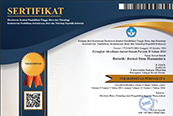Dennett and Posthumanism: A Defense of the Program to Naturalize Mind from Posthumanist Suspicions of Wolfe
(1) Universitas Gadjah Mada
(*) Corresponding Author
Abstract
This article criticizes Cary Wolfe’s interpretation of Daniel Dennett’s posthumanism which is structured in three categories of problem: language, representation, and species. According to Wolfe, humanism faces problems due to internal tensions stemming from the concepts of anthropocentrism and speciesism that constituted it. Both dogmas are considered institutionalized in cognitive science studies of language and its relationship with the mind, as exemplified by Dennett’s thought. Although Dennett is generally regarded as someone who contributed to moving cognitive science away from the Cartesian tradition, Wolfe considers him to have fallen back into the Cartesian mode of thinking due to his view of the cognitive difference between humans and non-human animals, namely by referring to humans’ ability to reflect on behavior, externalize cognitive functions, and stabilize the concept of self through representational capacity facilitated by language. This article argues that Wolfe fails to read Dennett’s intellectual project for several reasons: first, the cognitive difference between humans and non-human animals is not built on an essentialist ontology, but rather the opposite; second, the mental representationalism maintained by Dennett needs to be understood in terms of interpretivism rather than direct realism toward mental content; and third, stabilizing the concept of self through language does not bring back the Cartesian subject as a “ghost in the machine,” but rather as a social artifact enabled by the organization of information by a system/agent with a certain design architecture.
Keywords
Full Text:
PDF (Bahasa Indonesia)DOI: https://doi.org/10.24071/ret.v12i1.7456
Refbacks
- There are currently no refbacks.
Copyright (c) 2024 Dimas Aditya Wicaksono

This work is licensed under a Creative Commons Attribution 4.0 International License.
Retorik: Jurnal Ilmu Humaniora is published by the Graduate Program in Cultural Studies at Sanata Dharma University, Yogyakarta, Indonesia.
Retorik is also available in print edition. Please click here for contact information.










